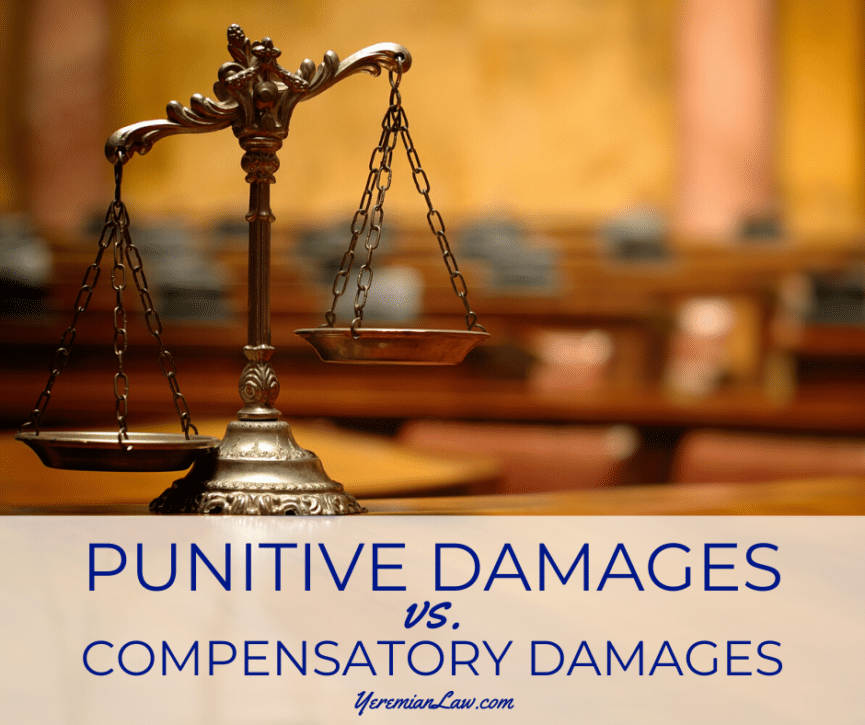Whether you’ve been in a car accident, suffered a slip and fall, or you were injured by a faulty product or bad drug, you could be entitled to financial compensation. If you can’t reach a settlement with the at-fault party’s insurance company, your personal injury attorney may suggest that you file a formal lawsuit in court. If you win, the money you get is called damages – and there are two types of damages: compensatory and punitive.
So when you look at punitive damages vs. compensatory damages, what are the differences between the two? Here’s what you need to know.
Punitive Damages vs. Compensatory Damages: The Basics
Punitive damages are designed to punish bad actors. They’re typically awarded to an injury victim whose injury was clearly preventable, especially when the person or business responsible for the injury should’ve known better.
Compensatory damages are designed to make up for, or compensate, the victim’s losses. Compensatory damages can cover things like medical bills, lost wages, pain and suffering, and other measurable losses.
Here’s a closer look at punitive damages vs. compensatory damages.
Punitive Damages
Judges or juries can award punitive damages in addition to compensatory damages in some lawsuits. California Civil Code 3294 allows juries to award them – but the victim in the case has to prove that the defendant’s conduct amounted to malice, oppression or fraud, such as when the case involves intentional harm or extreme recklessness. They’re typically awarded at the court’s discretion, such as when the defendant’s behavior was especially harmful and shows a blatant disregard for other people’s safety. Statistically, courts award punitive damages in about 5 percent of cases. It’s much more common for injury victims to receive compensatory damages.
Compensatory Damages
Judges or juries can award compensatory damages in a lawsuit. This money is intended to pay back the victim for losses, and it could be intended to cover:
- Medical bills, including emergency treatment, ambulance fees and hospital bills
- Future medical expenses, including physical therapy and rehabilitation, as well as medications and prescription drugs
- Lost pay from missing work, a reduced capacity to work or the loss of a job
- Lost pay in the future
- Increased living expenses
- Nursing home care
- Medical equipment
- Transportation
- Property damage or loss
- Mental anguish
- Disfigurement
- Long-term physical pain and suffering
- Loss of consortium
- Inconvenience
- Loss of enjoyment of life
- Loss of opportunity
Punitive Damages vs. Compensatory Damages: What’s Worth More?
 No two lawsuits are exactly the same, so the damages can vary greatly from one case to another. Because the courts base compensatory damages on a victim’s losses, they’re generally calculated by tallying up medical bills, lost wages and other losses (as well as adding future expenses and lost wages). When compensatory damages are calculated based on things like the loss of enjoyment of life or long-term physical pain and suffering, things get a bit fuzzy – but it’s up to judges and juries to decide what award is appropriate.
No two lawsuits are exactly the same, so the damages can vary greatly from one case to another. Because the courts base compensatory damages on a victim’s losses, they’re generally calculated by tallying up medical bills, lost wages and other losses (as well as adding future expenses and lost wages). When compensatory damages are calculated based on things like the loss of enjoyment of life or long-term physical pain and suffering, things get a bit fuzzy – but it’s up to judges and juries to decide what award is appropriate.
Punitive damages are also up to the courts to decide. In California, there’s no cap on the amount of punitive damages a court can award (some states set limits) – but the 14th Amendment to the U.S. Constitution does prohibit courts from imposing “grossly excessive” or “arbitrary” punishments. Additionally, the U.S. Supreme Court has held that punitive damages have to be reasonably proportional to the victim’s compensatory damage; the justices have said “few awards exceeding a single-digit ratio between punitive and compensatory damages, to a significant degree, will satisfy due process.” Often, a 5-to-1 ratio is seen as appropriate. Your attorney can talk to you about asking for punitive damages in your case, and he’ll be able to explain how the courts determine how much to award in more detail.
Related: Personal injury statute of limitations in California

Punitive Damages vs. Compensatory Damages: Frequently Asked Questions
Check out these frequently asked questions about the differences in punitive damages and compensatory damages. If you don’t see your question answered here, please call us at 818-230-8380 for a free consultation with an experienced personal injury attorney.
Which Are Larger: Punitive Damages or Compensatory Damages?
The purpose of punitive damages is to punish bad actors – and, essentially, make an example out of them. In many cases, punitive damages are higher than compensatory damages. That’s because compensatory damages are intended to compensate the victim, and often, they’re compensating the victim for tangible losses (such as medical bills and lost wages). Courts consider several factors when determining the amount for punitive damages, but typically, they won’t exceed more than nine or ten times the compensatory damages. For example, if you’re awarded $25,000 in compensatory damages, your punitive damages likely won’t be more than $250,000 (although judges do have a lot of leeway in ordering damages).

What is the Difference Between Compensatory and Punitive Damages?
Compensatory damages are designed to compensate an injury victim for his or her losses. They can cover things like medical bills, property damage and lost wages. Punitive damages are designed to punish bad actors and make an example out of them.
Related: Product liability lawsuit FAQs
Can Punitive Damages Be Awarded Without Compensatory Damages?
You typically can’t receive punitive damages without receiving compensatory damages. It has happened in the past, but it’s very uncommon. The Supreme Court ruled in State Farm v. Campbell that “punitive damages should only be awarded if the defendant’s culpability, after having paid compensatory damages, is so reprehensible as to warrant the imposition of further sanctions to achieve punishment or deterrence.”
Are Compensatory and Punitive Damages Taxable?
In a personal injury case, compensatory damages awarded for physical injuries are usually not considered taxable income. However, if you received compensatory damages for emotional distress that manifests with physical symptoms (such as headaches from stress), the IRS considers it taxable income. Punitive damages are taxable income.
You should certainly consult with a tax professional before you file your taxes if you’ve received damages in a personal injury lawsuit.
Related: TBI symptoms after an accident: When to call a lawyer
Is Emotional Distress Punitive Damages?
Emotional distress usually falls under compensatory damages, not punitive damages. This type of mental anguish can involve fear, anxiety, the loss of enjoyment of life and the loss of sleep. Although it’s difficult to put a dollar figure on this type of distress, courts often award compensatory damages to cover it.

Is Pain and Suffering Punitive Damages?
Pain and suffering don’t fall under punitive damages. If a judge awards you damages for pain and suffering, they will be compensatory – they’re designed to compensate you for what you’re going through.
Related: Common motorcycle accident injuries in California
What Are Examples of Punitive Damages?
Punitive damages are monies designed to punish someone for wrong doing and, by extension, discourage wrongdoing from other parties in the future. Courts typically award them in cases of gross misconduct – misconduct that’s so over the top that it’s reprehensible. Some examples of punitive damages awarded in the past include:
- A Los Angeles jury awarded $4.9 billion in punitive damages to a family who suffered permanent, disfiguring injuries when their General Motors van exploded in a crash. (Read about it here.)
- A Missouri jury awarded $4.14 billion in punitive damages to 22 women who were diagnosed with ovarian cancer after using Johnson & Johnson’s talcum powder, which contained asbestos. (Read about it here.)
- A Kansas City jury awarded a cancer victim $2 billion in punitive damages after a pharmacist admitted to diluting cancer treatment drugs in order to make a larger profit. (Read about it here.)
What Are Compensatory Damages?
Compensatory damages are monies intended to compensate an injury victim for loss. They can include money to cover things like medical bills, future medical expenses, lost wages (both now and in the future), increased living expenses and nursing home care, transportation, and property damage. Compensatory damages can also cover things like mental anguish, loss of enjoyment of life, emotional distress, and pain and suffering.
Related: 5 things you need to know about leg pain after a car accident
Are Attorney’s Fees Damages?
Attorney’s fees are not damages. Typically, personal injury attorneys don’t get paid unless you win your case. In the event that you win, your attorney will take his or her fees out of the amount you win. As a result, personal injury attorneys won’t take on a case unless it’s strong enough that the victim will most likely win.

How Are Compensatory Damages Taxed?
Sometimes compensatory damages are taxable. Taxability depends on the type of compensatory damages you receive – whether they’re for physical injury or for emotional injury. Compensation you receive for physical injuries, like broken bones, cuts and bruises is not taxable. Compensation for emotional injury is taxable.
It is always a good idea to talk to a tax professional if you receive damages in a lawsuit.
Related: What bones are most likely to be broken in a car accident?
What Are Punitive Damages in a Lawsuit?
Punitive damages in a lawsuit are designed to punish a negligent party and deter others from doing the same thing that the negligent party did.
How Are Punitive Damages Calculated?
There’s no fixed standard for calculating punitive damages in California. However, a jury can consider these factors:
- How bad the defendant’s conduct was
- Whether there’s a reasonable relationship between the plaintiff’s harm and the amount of punitive damages
- What amount would serve to punish the defendant and discourage future wrongful conduct while still considering the defendant’s financial circumstances
Do You Need to Talk to a Lawyer About Punitive Damages vs. Compensatory Damages?
If someone else’s carelessness has caused you injury, or if a defective product or drug harmed you, we may be able to help you. We can visit you at home, in the hospital or elsewhere to talk about your case – and if you’re entitled to financial compensation, we can help you get it. Call us right away at 818-230-8380 or fill out the form below to tell us what happened.




